Are you torn between the allure of China and the charm of Japan for your next travel adventure? SIXT.VN is here to guide you through a detailed comparison to help you make the perfect choice for an unforgettable experience. Whether you crave ancient history, vibrant cityscapes, stunning landscapes, or delectable cuisine, both destinations offer unique and compelling attractions. Let SIXT.VN assist you in planning your trip, offering services from airport transfers to hotel bookings, ensuring a seamless and enriching journey. You’ll discover insider tips, cultural insights, and practical advice to make your decision easier.
1. What Are The Key Cultural Differences Between China And Japan?
Japanese culture is a captivating blend of tradition and modernity, influenced by Shintoism, Buddhism, and Confucianism, yet it leads in technology and fashion. China, one of the oldest civilizations, boasts a rich history shaped by dynastic rule and philosophies like Confucianism and Taoism.
1.1 Japanese Cultural Nuances
Japan seamlessly integrates ancient traditions with modern innovations. You might witness bullet trains speeding past ancient temples or geishas using high-tech vending machines. Social harmony is paramount, with values like humility and respect for elders deeply ingrained. Philosophies like ikigai (reason for being), omotenashi (impeccable hospitality), and kaizen (continuous improvement) are integral to daily life.
1.2 Chinese Cultural Tapestry
China’s culture is rich and complex, with 56 ethnic groups. Ancient philosophies such as the five elements and yin-yang are interwoven into daily life. Traditional values like family, harmony, and loyalty remain central. Cities like Shanghai showcase the contrast between the ancient and modern, with skyscrapers towering over traditional lilong houses.
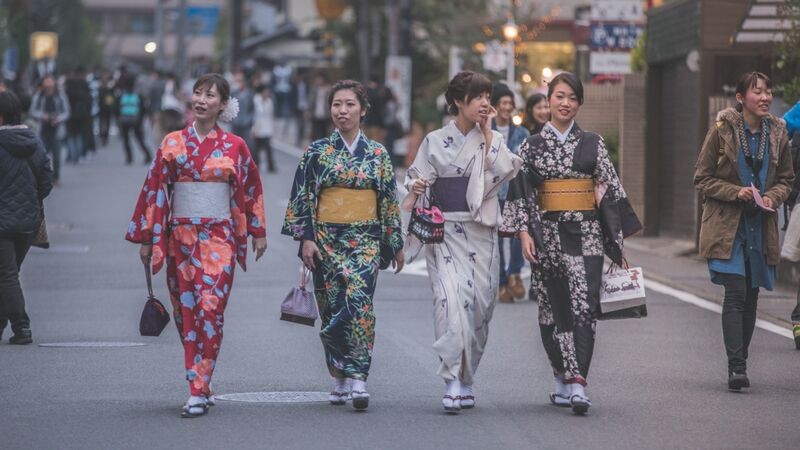 Women in Kyoto wearing traditional Kimonos
Women in Kyoto wearing traditional Kimonos
2. Which Country Offers A More Diverse Culinary Experience, China Or Japan?
Both China and Japan offer incredible culinary experiences, though with distinct differences. Japanese cuisine emphasizes fresh, seasonal produce and meticulous preparation, while Chinese cuisine often features bolder flavors, spices, and a wider variety of meats and regional styles.
2.1 Japanese Gastronomic Delights
Japanese cuisine is celebrated for its emphasis on fresh, seasonal ingredients and precise preparation. Dishes typically include rice or noodles, side dishes, and soup. Seafood is a highlight, with popular dishes like sushi, ramen, tempura, unagi (grilled eel), takoyaki (octopus dumplings), karaage (Japanese fried chicken), yakitori (meat skewers), and shabu-shabu (hot pot). Tea culture is significant, with matcha lattes and traditional tea ceremonies being integral experiences.
2.2 Chinese Culinary Variety
China’s vast size results in diverse regional cooking styles. Chinese food tends to be bolder, using more spices, chilli, and oil. Meat is prevalent, including beef, pork, and duck, along with seafood and tofu. Famous dishes include kung pao chicken, Peking roast duck, Mapo tofu, and char sui. Sichuan cuisine is known for its spicy Sichuan pepper. Tea is also an essential part of Chinese culture.
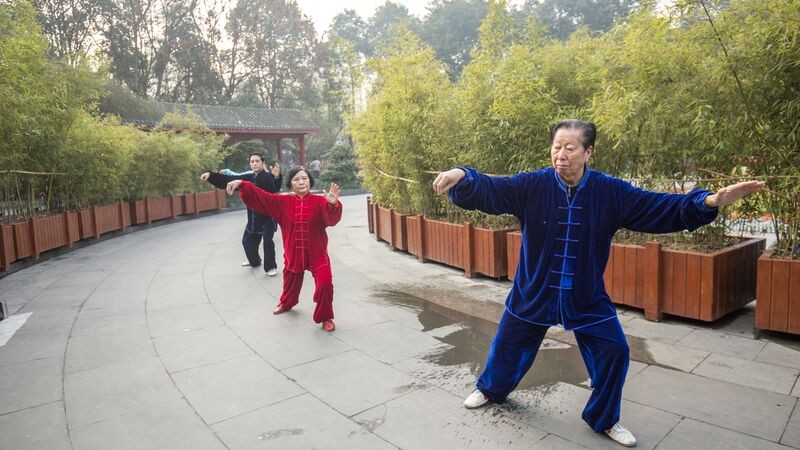 Person performing Tai Chi with a sword in Chengdu, China
Person performing Tai Chi with a sword in Chengdu, China
3. What Are The Must-Visit Cities In Japan And China?
Japan boasts modern, bustling cities like Tokyo and cultural hubs like Kyoto, while China offers historical capitals like Beijing and cosmopolitan centers like Shanghai. Each city provides unique attractions and experiences that reflect the country’s distinct character.
3.1 Japan’s Urban Gems
Tokyo is a world-renowned metropolis blending futuristic technology with ancient landmarks. Explore neon-lit streets, quirky cafes in Harajuku, and the famous Shibuya Crossing. Kyoto offers cultural richness with shrines, temples, and the Geisha district of Gion. Matsumoto showcases impressive castles and traditional storehouses. Hiroshima provides historical sites and a vibrant food scene.
3.2 China’s Metropolitan Marvels
Beijing, China’s capital, features UNESCO World Heritage sites, hidden hutongs, the Great Wall, and Chinese opera. Shanghai blends cultures and architecture with art deco buildings and lantern-lit canals. Xitang, a nearby water town, offers a glimpse into 19th-century trade history.
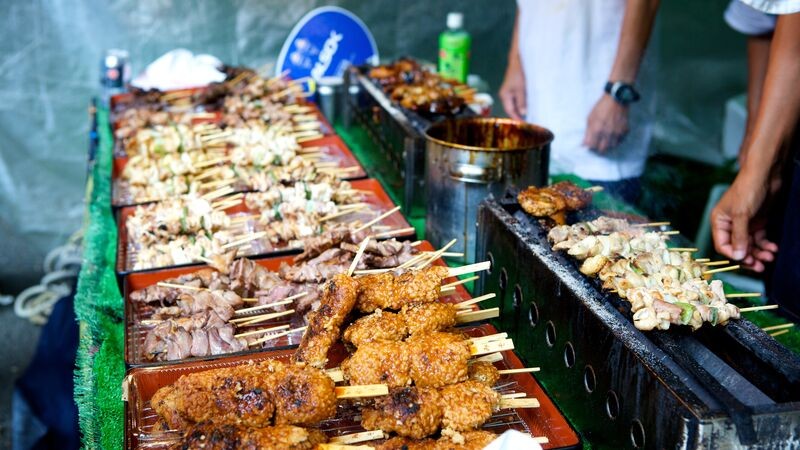 Yakitori, meat skewers in Tokyo, Japan
Yakitori, meat skewers in Tokyo, Japan
4. Which Country Offers More Diverse And Stunning Landscapes?
Both Japan and China boast incredible natural beauty, but China’s vast size allows for more diverse landscapes, including mountains, deserts, and rice terraces, while Japan is known for its volcanoes, forests, and coastline.
4.1 Japan’s Natural Beauty
Japan’s diverse landscapes include towering peaks, dense forests, and a pristine coastline. It has over 100 volcanoes, including Mt. Fuji. Popular natural attractions include Mount Takao, Arashiyama Bamboo Grove in Kyoto, Takachiho Gorge in Miyazaki, and Miyajima Island near Hiroshima.
4.2 China’s Landscape Variety
China’s landscapes are incredibly diverse, with over 550 species of mammals and 31,000 types of flora. Highlights include the karst hills of Guilin along the Li River, the Rainbow Mountains in Zhangye Geopark, Mount Emei, and the floating peaks of Zhangjiajie.
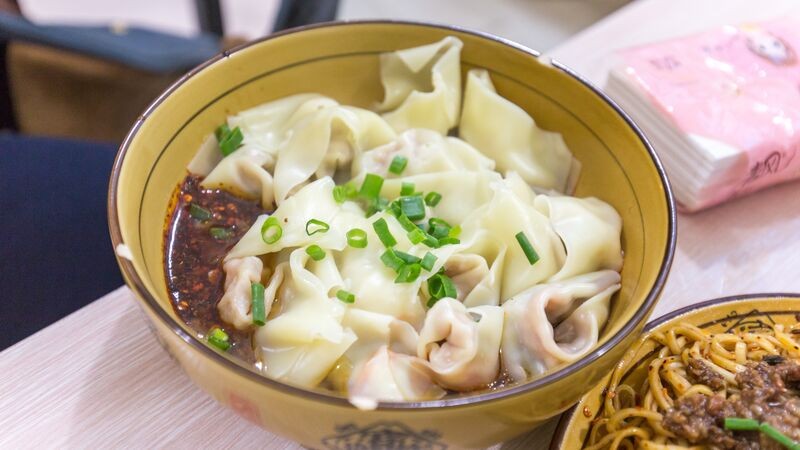 Wonton soup in Chengdu, China
Wonton soup in Chengdu, China
5. How Does The Weather Differ Between China And Japan, And When Is The Best Time To Visit Each?
Japan has four distinct seasons with pleasant weather in spring and autumn, while China’s climate varies greatly due to its size, with potential for intense heat, humidity, and snow depending on the region and time of year.
5.1 Japan’s Seasonal Weather
Japan has a temperate climate with four distinct seasons. Spring (March to May) is popular for cherry blossoms. September to November offers autumn foliage. Winter is mild in places like Osaka and Tokyo, with snow in northern Japan, ideal for skiing.
5.2 China’s Varied Climate
China’s climate varies significantly. Northern regions have hot, dry summers, while eastern and southern regions are more humid. Snow is common in winter, especially in the north. Summer and autumn are best for outdoor activities, while winter is ideal for cultural festivals.
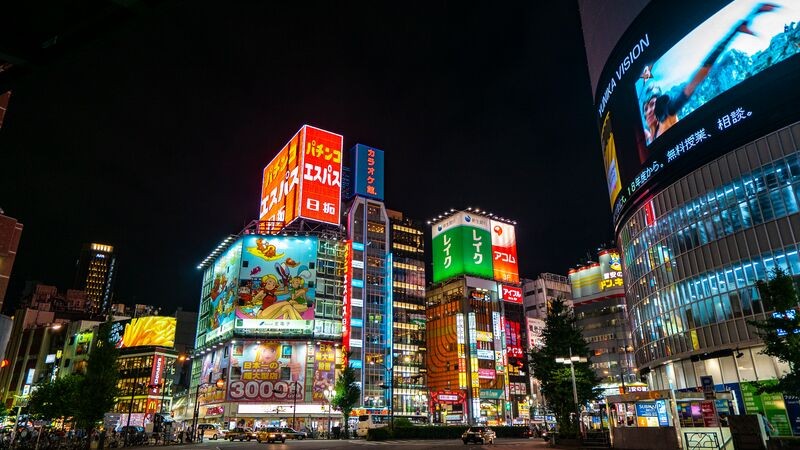 Tokyo with neon signs at night
Tokyo with neon signs at night
6. How Do The Accommodation Options Compare Between China And Japan?
Both countries offer a wide range of accommodation options, from traditional Ryokans in Japan to modern hotels and unique stays in China, catering to different budgets and preferences.
6.1 Accommodation Choices in Japan
Japan provides various accommodation options, including modern hotels, traditional Ryokans (Japanese inns), and unique stays like capsule hotels. Ryokans offer traditional Japanese hospitality, featuring tatami mats, futon beds, and onsen (hot springs). Capsule hotels are a budget-friendly option for solo travelers.
6.2 Accommodation Variety in China
China offers a wide array of accommodation choices, from luxury hotels in major cities to budget-friendly hostels and guesthouses in smaller towns. Unique stays, such as traditional courtyard homes in Beijing and boutique hotels in Shanghai, provide an authentic cultural experience.
7. What Are The Best Transportation Options For Traveling Around China And Japan?
Japan’s efficient and extensive public transportation system makes it easy to travel between cities, while China’s transportation options are rapidly improving, with high-speed trains and domestic flights connecting major destinations.
7.1 Getting Around Japan
Japan’s public transportation system is renowned for its efficiency and punctuality. The Shinkansen (bullet train) is ideal for traveling long distances. Local trains, subways, and buses are readily available in cities. Consider purchasing a Japan Rail Pass for cost-effective travel.
7.2 Navigating China
China’s transportation network has improved significantly, with high-speed trains connecting major cities. Domestic flights are also a convenient option for covering long distances. In cities, metros and buses are common, while taxis and ride-sharing services offer door-to-door transport.
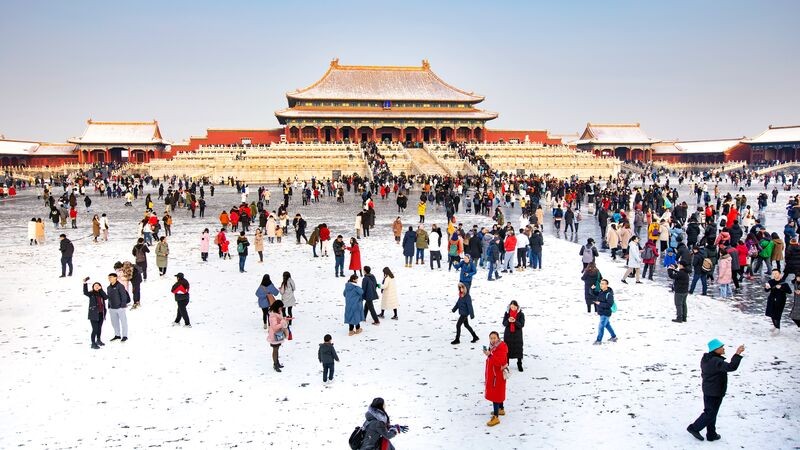 Forbidden City in Beijing, China with snow
Forbidden City in Beijing, China with snow
8. How Do The Costs Of Travel Compare Between China And Japan?
Generally, Japan tends to be more expensive than China, especially in terms of accommodation, transportation, and dining, but both countries offer budget-friendly options for savvy travelers.
8.1 Budgeting for Japan
Japan can be relatively expensive, especially in major cities. Accommodation, transportation, and dining costs can add up quickly. Budget travelers can save money by staying in hostels or capsule hotels, using public transportation, and eating at local eateries.
8.2 Budgeting for China
China is generally more affordable than Japan, though costs can vary depending on the region and travel style. Accommodation and food are relatively inexpensive, particularly outside major cities. Transportation costs can be reduced by using public transport and booking in advance.
9. What Unique Experiences Can You Have In China That You Can’t Have In Japan, And Vice Versa?
China offers experiences like walking the Great Wall and exploring the Terracotta Army, while Japan provides opportunities to participate in tea ceremonies and experience the tranquility of Zen gardens.
9.1 Unique Chinese Experiences
- Walking the Great Wall: Experience the iconic Great Wall of China, a symbol of Chinese history and engineering.
- Exploring the Terracotta Army: Visit the Terracotta Army in Xi’an, an impressive collection of life-sized clay soldiers.
- Visiting the Giant Panda Breeding Research Base: Get up close with adorable giant pandas at the research base in Chengdu.
9.2 Distinct Japanese Experiences
- Participating in a Tea Ceremony: Immerse yourself in the serene and ritualistic Japanese tea ceremony.
- Experiencing a Zen Garden: Find tranquility in meticulously designed Zen gardens, such as Ryoan-ji in Kyoto.
- Staying in a Traditional Ryokan: Enjoy traditional Japanese hospitality in a Ryokan, complete with onsen and local cuisine.
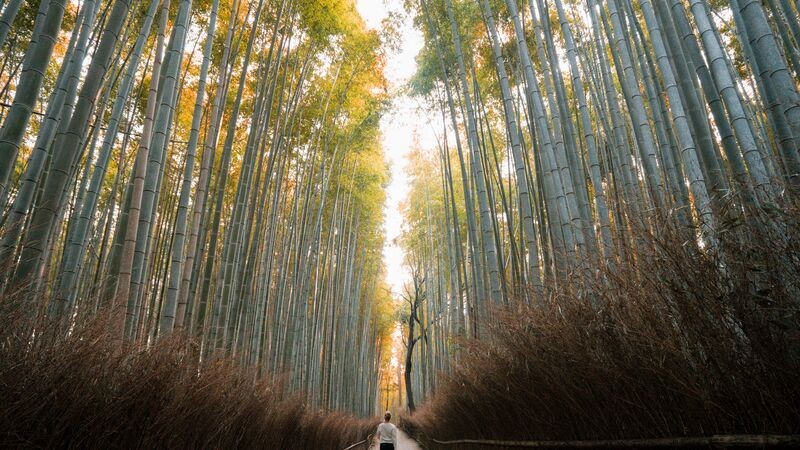 Bamboo forest in Kyoto, Japan
Bamboo forest in Kyoto, Japan
10. How Can SIXT.VN Enhance Your Travel Experience In China Or Japan?
SIXT.VN offers comprehensive travel services, including airport transfers, hotel bookings, and customized tour packages, ensuring a smooth and hassle-free experience for travelers to both China and Japan.
10.1 SIXT.VN Services in China
SIXT.VN provides a range of services to enhance your trip to China:
- Airport Transfers: Enjoy comfortable and reliable airport transfers to your hotel.
- Hotel Bookings: Choose from a wide selection of hotels to suit your budget and preferences.
- Customized Tours: Explore China with personalized tour packages tailored to your interests.
- Local Support: Receive assistance from local experts to ensure a smooth and enjoyable trip.
10.2 SIXT.VN Services in Japan
SIXT.VN also offers comprehensive services for travelers to Japan:
- Airport Transfers: Start your trip stress-free with convenient airport transfer services.
- Hotel Bookings: Find the perfect accommodation, from modern hotels to traditional Ryokans.
- Tailored Tours: Discover Japan with customized tour packages designed to match your interests.
- Travel Assistance: Benefit from local travel tips and support from experienced professionals.
 Rainbow Mountains in Zhangye National Geopark, China
Rainbow Mountains in Zhangye National Geopark, China
Conclusion: China or Japan? Let SIXT.VN Help You Decide
Both China and Japan offer incredible experiences, with unique cultural, culinary, and natural attractions. Whether you’re drawn to the ancient wonders of China or the modern marvels of Japan, SIXT.VN is here to help you plan your perfect trip. Contact us today to book your airport transfers, hotels, and customized tours for an unforgettable adventure!
Address: 260 Cau Giay, Hanoi, Vietnam
Hotline/Whatsapp: +84 986 244 358
Website: SIXT.VN
FAQ About China Vs Japan Tourism
1. Is it more expensive to travel to China or Japan?
Generally, Japan is more expensive than China due to higher costs for accommodation, transportation, and dining. However, both countries offer budget-friendly options for savvy travelers.
2. Which country is better for first-time travelers, China or Japan?
Japan is often considered easier for first-time travelers due to its efficient public transportation, widespread English signage, and well-organized tourism infrastructure. China can be more challenging due to language barriers and cultural differences, but it offers a richer and more diverse experience.
3. What are the main cultural differences between China and Japan?
Japanese culture emphasizes harmony, politeness, and precision, while Chinese culture values family, tradition, and practicality. Both cultures have deep historical roots but have evolved differently over time.
4. Which country offers more diverse food options, China or Japan?
China offers a wider variety of regional cuisines due to its vast size and diverse ethnic groups. However, Japanese cuisine is renowned for its meticulous preparation, seasonal ingredients, and unique flavors.
5. What are some must-see landmarks in China and Japan?
Must-see landmarks in China include the Great Wall, Forbidden City, Terracotta Army, and Li River. In Japan, popular landmarks are Mount Fuji, Tokyo Skytree, Fushimi Inari Shrine, and Hiroshima Peace Memorial Park.
6. Which country is better for nature lovers, China or Japan?
Both countries offer stunning natural landscapes. China boasts diverse landscapes, including mountains, deserts, and rice terraces, while Japan is known for its volcanoes, forests, and coastline.
7. What is the best time to visit China and Japan?
The best time to visit Japan is during spring (March to May) for cherry blossoms or autumn (September to November) for colorful foliage. For China, spring and autumn offer pleasant weather for most regions.
8. Are there any language barriers when traveling in China and Japan?
Yes, language can be a barrier in both countries. While English is more widely spoken in Japan than in China, learning some basic phrases in Mandarin or Japanese can enhance your travel experience.
9. What type of accommodations are available in China and Japan?
Both countries offer a range of accommodations from luxury hotels to budget-friendly hostels. Japan also offers unique options like Ryokans (traditional inns) and capsule hotels, while China features traditional courtyard homes and boutique hotels.
10. How can SIXT.VN help with my travel plans to China or Japan?
SIXT.VN offers comprehensive travel services, including airport transfers, hotel bookings, and customized tour packages. We ensure a smooth and hassle-free experience for travelers to both China and Japan.



